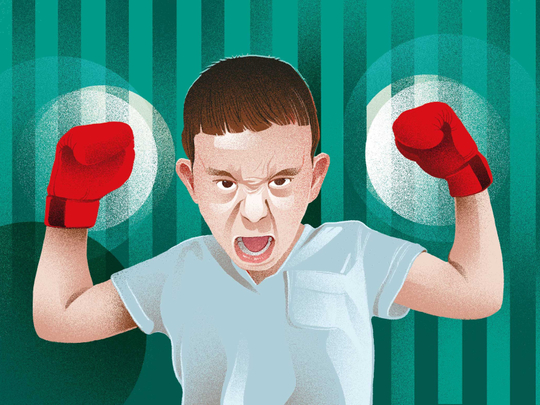
Parenting
I would intervene only if children become violent
As a parent, I would allow my children to argue and debate among themselves and would not interfere because it prepares them for the real world. Life is full of conflicting ideas and opinions, and it gives them the ability to reason things out and develops their critical and analytical thinking.
The downside is that, yes, it might make them argumentative, so as a parent, I should know when to engage. It is alright if children talk about nonsensical things but what they should not do is say something that is incorrect. I would not let my son say, for example, that the Earth is the center of the universe but as they are still young, I would let them believe in Santa Claus. But one thing is for sure — I would intervene when they become violent. If they are passionate about a topic I will explain what I have to explain and not allow them to hurt one another.
From Mr Carlos Ante
Purchase officer living in Dubai
Confidence
If parents are keen to listen, your relationship grows stronger
We definitely taught our daughter that it is okay to disagree but it is not okay to argue all the time. The reason is that if you argue, you lose your balance a bit. Of course, it depends on each child, some lose their balance quickly and others don’t. So, if the child is in control of their emotions, then they should definitely be encouraged to put their point of view across. But if they lose their balance, they will start thinking of their parent as an enemy. On a different note, I do believe that if a child doesn’t think that their parent is an enemy at least once a month, the parenting is not right.
Children should be able to put their point forward, but in a good manner. I always told my daughter that if you have a point of view, put it forward, but not in a rude manner. Be strong, especially if you feel strongly about it but if someone disagrees with you and provides a logical reason for it, then accept it. Think it over and if necessary change your perspective. Sometimes, you are right and sometimes you are wrong. They learn that from you, the parent. When parents put the child down and ask them to stay quiet then their confidence level goes down and they tend to become introverts. They also start expecting the same from other people, when they are going about doing their jobs or their assignments.
On the other hand, if you give them a keen ear and tell them that there are some things that even I am not aware of and could learn from you, the relationship becomes healthier, the energy around your home becomes more positive and the child becomes tougher.
From Mr Sunil Chawla
Director of an organic pest-control company in Dubai
Life lesson
Conflicts are part of life, teach them how to deal with it
When talking about the relative benefits of arguments, I think we need to be careful about the language used. Argument has a negative connotation but conflict resolution is more positive. Being able to express your own opinion is important to a child’s development of self and feeling like what they have to say matters and is important to others. Indeed, conflicts within relationships are a normal part of life and children witnessing how these can be dealt with and managed in a positive way shows that it is okay to have differing opinions but we can still love and respect the other person. This teaches them a huge lesson on tolerance. Witnessing parents being able to disagree without destroying their relationship and being able to distinguish between their own anger and other people’s faults teaches children important lessons in negotiation and perspective. It is much healthier for children to develop these skills than to be fearful of disagreement and avoid confrontation as this means they are less likely to assert their own needs and wishes in the future.
Children need to be exposed to arguments and disputes in order to learn the skills to deal with these. As a parent, it is our role to help our children learn how to navigate through such experiences. To teach them how to engage in the conflicts they face that lead to a positive outcome and how to learn from these encounters. This can be done through modelling and talking through situations as children experience them. As parents we should try to foster a sense of empathy and understanding of others in children, help them to identify triggers, learn to apologise if they have made a mistake, and practice making compromises.
From Dr Amy Bailey
Clinical Psychologist working in Dubai
Teaching children how to argue in a constructive, assertive manner, is giving them a skill for life. As is the nature of human relationships, arguments are inevitable. However, how we choose to deal with these situations is what matters most. Through my experience in working with children and families, I have found there to be benefits in teaching children how to manage conflict effectively. Children learn how to stand up for what they believe in and express their feelings and opinions in an assertive way. They learn how to look at a problem from different angles and see how there can be multiple perceptions to one reality. It is through negotiation that children learn about empathy and compromise. They learn how to ‘agree to disagree’ by negotiating, children also learn how to face the reality that there are times when we may not agree with others’ opinions but that we can still respect their viewpoints. Children who are better equipped at managing conflict in an assertive way are able to build and maintain healthier relationships with their peers, which in turn is linked to emotional wellbeing.
Children who grow up in homes where different opinions are expressed, may be more open to the ideas of others. By respecting individual differences and being willing to view situations from different angles, one can adopt more of a flexible, open-minded approach to life. Although creativity may be a by-product of open-mindedness, I believe that it may be a generalisation to assume that all children raised in such environments grow up to be creative adults.
Children model themselves on the behaviour of their parents. If the significant adults in a child’s life are unskilled at managing conflict, and adopt a passive or aggressive communication style, the child will learn to address arguments in a similar fashion. By managing conflict in this way, children will be more vulnerable to being subjected to bullying. The bullying, if not addressed by the adult, might then escalate to violent behaviour within the home environment.
Learning the art of negotiation is a valuable and necessary life skill. By shying away from conflict at home, it might have a negative impact on a child’s social and emotional development. Research suggests that parents who encourage their children to engage in healthy negotiations with them, in turn boost their self-esteem, confidence and social skills.
From Ms Christine Kritzas
Counselling psychologist living in Dubai
Gulf News asked: Do your children know how to argue constructively?
• Yes 49%
• No 51%
Have Your Say: Do you think most parents have the skills to enable constructive arguments among children? Or does encouraging argument turn the risk of making children argumentative? Is voicing differing opinions, especially with adults, considered disrespectful in your culture? How do you balance that with building free thinking in your child? Share your views and participate in future debates. Email us at readers@gulfnews.com













